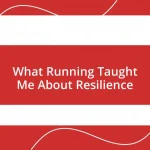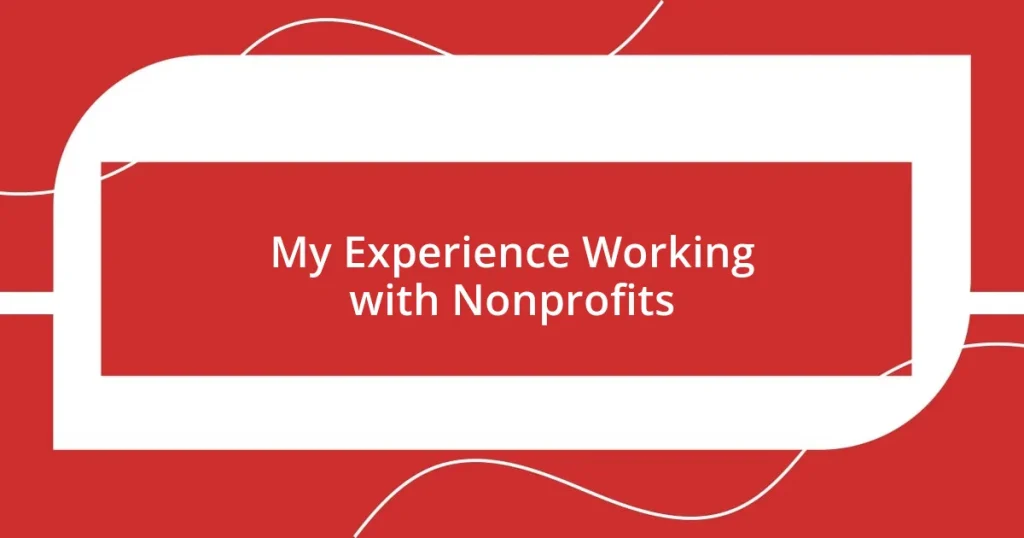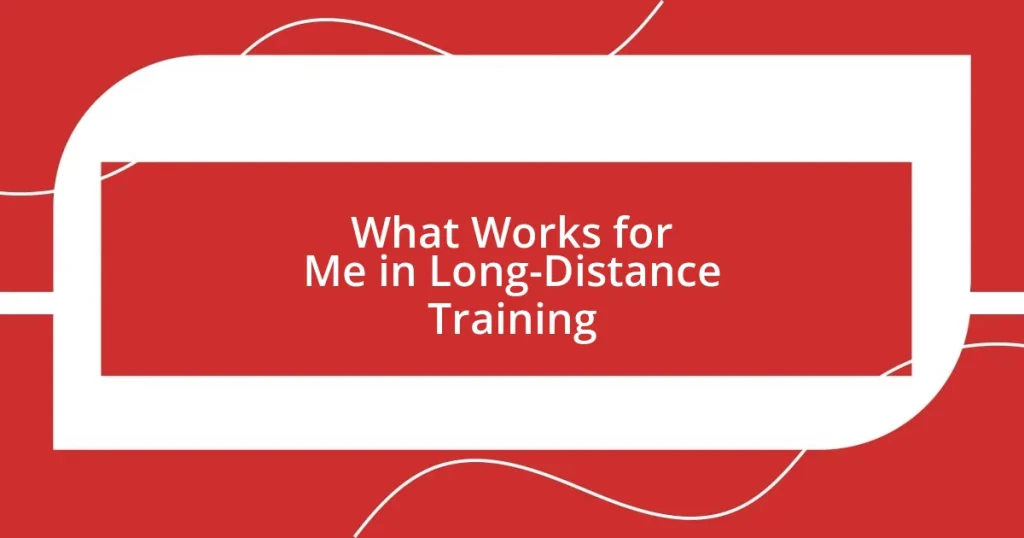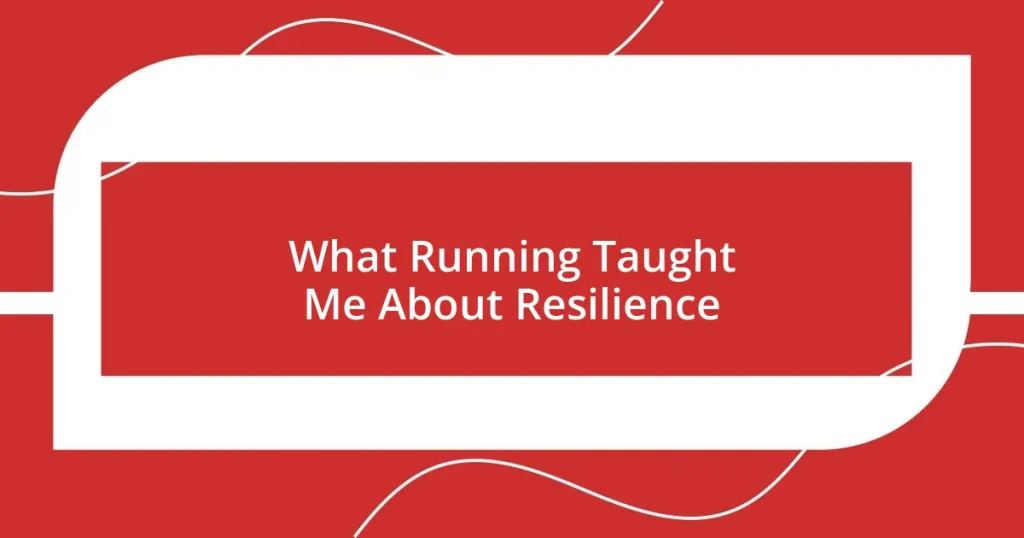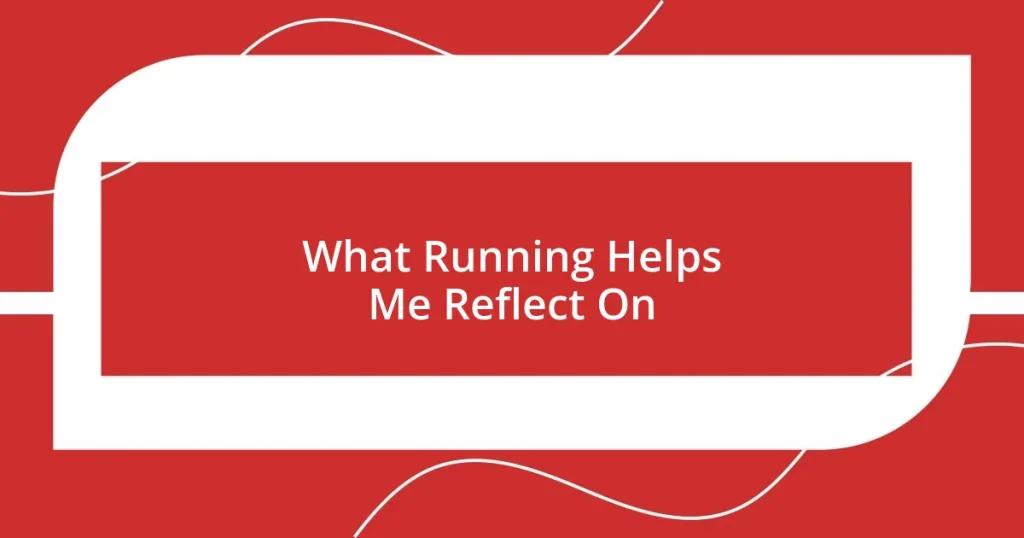Key takeaways:
- Nonprofits prioritize community impact over profit, driven by empathy and a desire to uplift others.
- Key motivations for engaging in nonprofit work include creating change, empathy, community building, and personal growth.
- Essential skills developed in nonprofits include public speaking, collaboration, and problem-solving, often learned through overcoming challenges.
- Effective partnerships are built on open communication, mutual respect, and shared values, enhancing collaborative success.
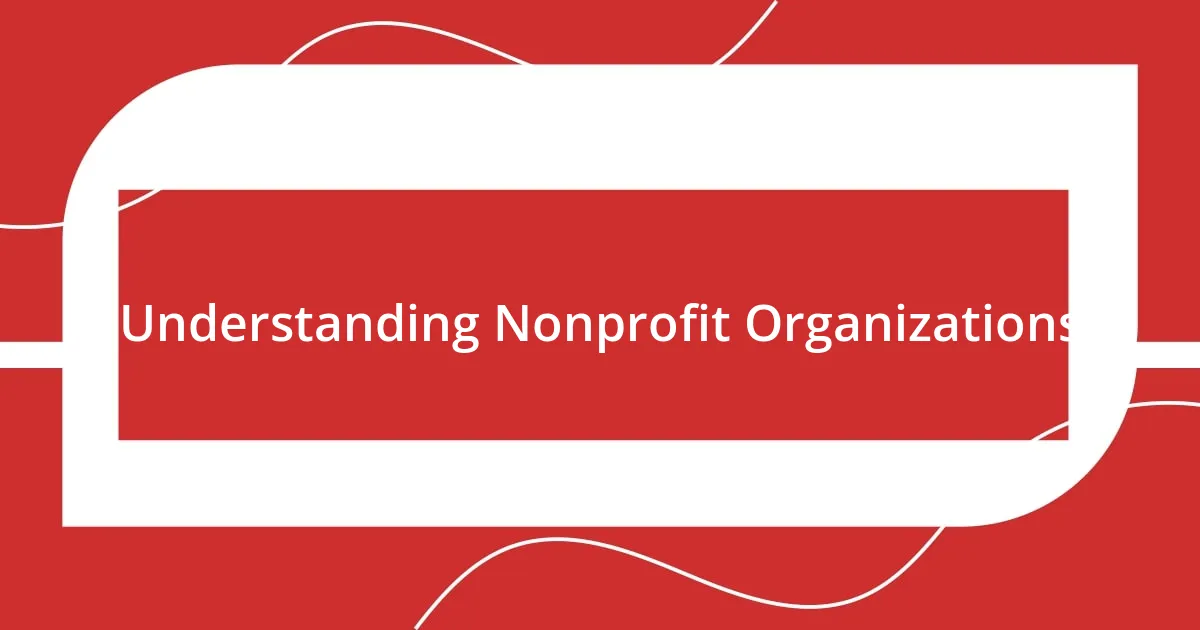
Understanding Nonprofit Organizations
Nonprofit organizations are unique in that they prioritize their missions over profit-making. I remember my first experience volunteering with a local shelter; it was eye-opening to see how a group of passionate individuals could come together, driven by a common goal to help those in need. Have you ever wondered what truly motivates people to engage in such selfless work?
At the heart of nonprofits is the concept of community impact. I’ve had the privilege of witnessing firsthand how grassroots organizations can create a ripple effect, transforming lives and neighborhoods. It’s inspiring to see how a small initiative can grow into a powerful movement, fueled by the dedication of volunteers and donors alike.
What stands out to me is the strength of vulnerability within these organizations. Often, the stories shared by individuals impacted by nonprofit efforts reveal deep emotional connections. When you listen to someone share their journey towards recovery or empowerment, you can’t help but feel that your own heart is moved. This emotional landscape is what makes the nonprofit sector so vital; it’s built on empathy and a genuine desire to uplift others.
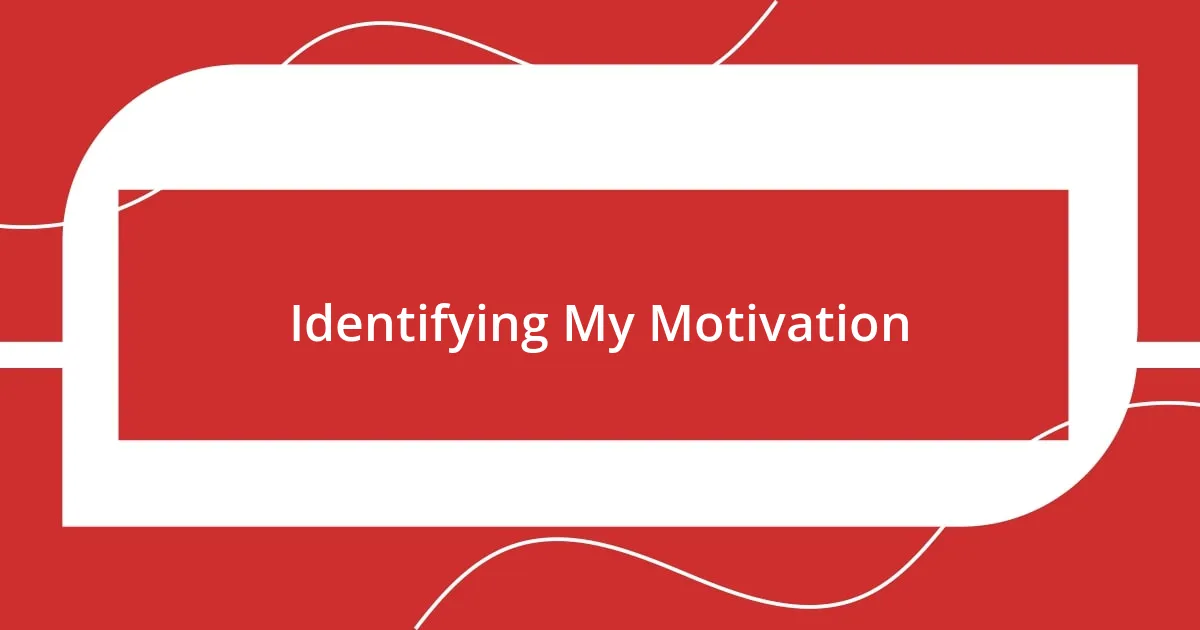
Identifying My Motivation
Identifying my motivation to work with nonprofits stemmed from a personal experience that reshaped my perspective on giving back. There was a time when I faced a challenge that felt insurmountable—moving to a new city and feeling lost. But my involvement with a local mentoring program not only provided me with direction but also illuminated the impact one can have through service. That sense of purpose became a guiding light for my work in the nonprofit sector.
Reflecting on what drives my passion, I’ve pinpointed several key motivations:
- Desire to Create Change: I want to be part of something larger than myself, making a tangible difference.
- Empathy for Others: I believe in the power of shared experiences, and connecting with those who face difficulties fuels my commitment.
- Building Community: There’s something incredibly rewarding about bringing people together to foster growth and support.
- Personal Growth: The challenges I face in nonprofit work often push me to learn, adapt, and evolve.
Each of these elements reinforces my dedication, revealing how much the nonprofit world enriches my life while allowing me to contribute to the lives of others.
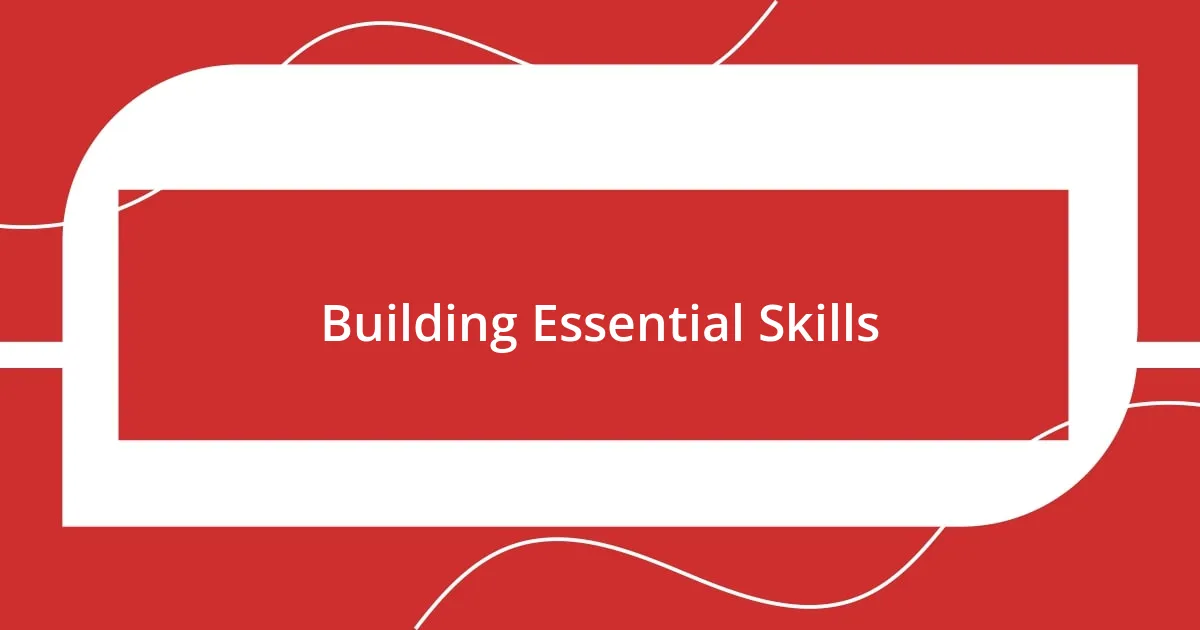
Building Essential Skills
Building essential skills while working with nonprofits has been a transformative part of my journey. Whenever I stepped into a new role, I noticed not just the impact of my work, but the skills I was honing along the way. One moment that sticks out for me was during a fundraising event where I was tasked with public speaking. I remember feeling a mix of excitement and fear. But as I began to share our mission with an engaged audience, I realized that I was developing not only my presentation skills but also the ability to connect with people on a deeper level. Have you ever faced a moment that pushed you beyond your comfort zone? Those moments, albeit challenging, are where real growth happens.
In my experience, collaboration is another critical skill fostered in the nonprofit sector. I recall working with a diverse team to launch a community project aimed at environmental sustainability. It was enlightening to see how different perspectives could combine to create innovative solutions. Learning to listen actively and valuing others’ input was pivotal. How often do we overlook the power of collaboration in our daily lives? Each team meeting became an opportunity to refine this skill, showing me the importance of teamwork in achieving shared goals.
Moreover, problem-solving skills are continually strengthened within the nonprofit environment. There were countless times I faced unexpected challenges, from budget constraints to last-minute changes in project plans. I vividly remember a project where we had to switch our approach entirely just days before launch. It forced me to think creatively and adapt quickly. Those experiences taught me that setbacks are often stepping stones to new solutions. Have you ever had to pivot quickly in a project? It’s remarkable how those moments of urgency can sharpen one’s ability to innovate.
| Essential Skills | Personal Experience |
|---|---|
| Public Speaking | Developed while sharing mission at a fundraiser |
| Collaboration | Enhanced through diverse teamwork on environmental project |
| Problem-Solving | Improved by adapting to unexpected project challenges |
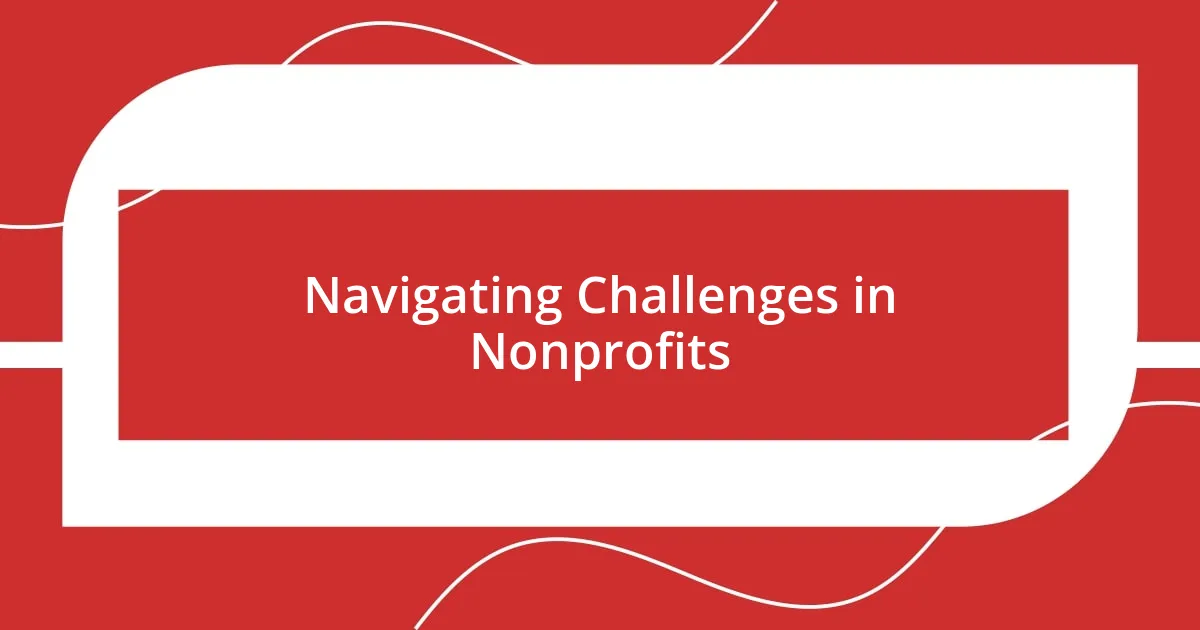
Navigating Challenges in Nonprofits
Navigating challenges in the nonprofit sector can often feel like walking a tightrope. I vividly remember a time when we were organizing a community event and everything seemed to go wrong—permits were delayed, and our venue fell through last minute. It was stressful, to say the least, but it taught me the importance of flexibility. Sometimes, you have to remind yourself: how can a setback lead to unexpected opportunity? I found a new location that not only met our needs but also brought in more attendees than we anticipated.
Resource limitations pose another significant challenge that many nonprofits face. I’ve been part of discussions where we had to stretch every dollar to make our vision a reality. During a campaign aimed at supporting local families, we had to get creative with our resources. I recall brainstorming how to engage local businesses for in-kind donations instead of monetary support. Have you ever faced a situation where you had to think outside the box to accomplish your goals? Those conversations with my team are some of the most fulfilling moments, proving that with collaboration and ingenuity, we can achieve incredible outcomes.
The emotional weight of nonprofit work can’t be understated either. One moment that stays with me was during a client meeting with individuals whose lives had been profoundly affected by hardship. Listening to their stories was not only humbling but also a stark reminder of our mission’s urgency. How do we balance empathy with actionable results? I learned that navigating these emotional challenges requires self-care practices. Walking away from those discussions, I often found myself reflecting on my own motivations and remembering why I chose this path in the first place.
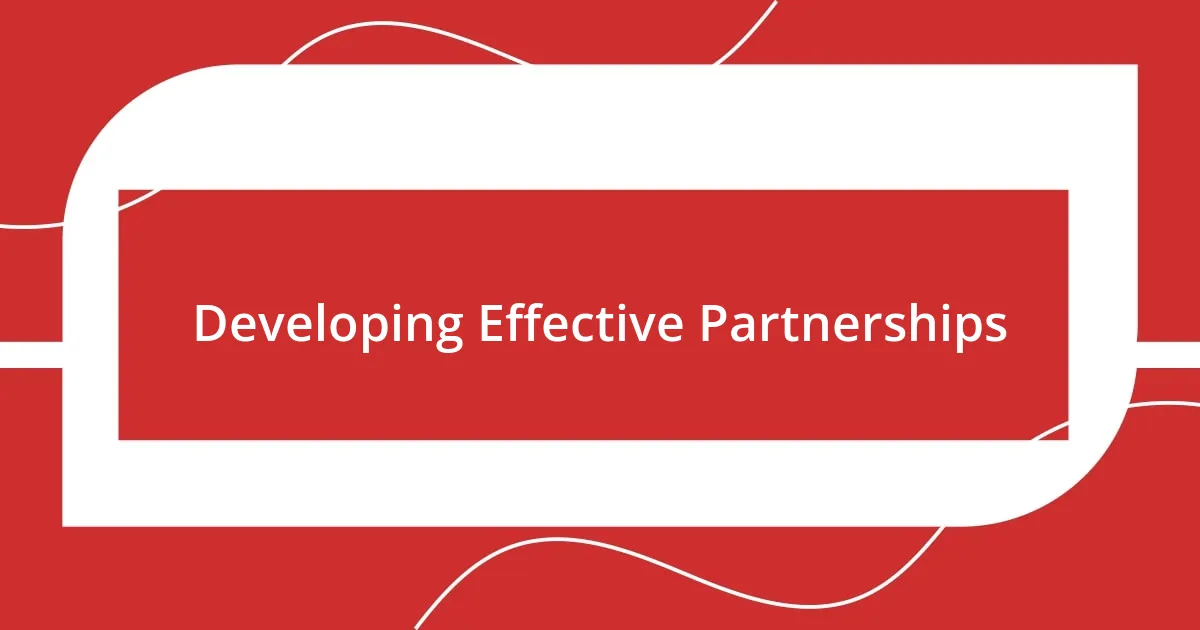
Developing Effective Partnerships
Developing effective partnerships in the nonprofit world has been pivotal to my experiences. I recall a particular collaboration with another local organization that focused on youth empowerment. We sat down for a brainstorming session, and the synergy in the room was palpable. It struck me how combining our strengths not only amplified our outreach but also nurtured a spirit of camaraderie. Have you ever experienced that magic when two entities align towards a common goal? It’s transformative.
As I delved deeper into partnership dynamics, I learned the art of open communication. There was a time we faced misunderstandings that could have derailed our efforts. Instead of lingering in silence, we established regular check-ins to ensure everyone felt heard. This commitment to transparency resulted in more productive meetings—and honestly, it enhanced our trust. How crucial is it to maintain an open dialogue in teamwork? I found that creating space for honest conversations often means the difference between success and failure.
Moreover, mutual respect and shared values emerged as foundational elements in these partnerships. During one project on food insecurity, I witnessed how aligning our missions led to a wealth of insights. We each brought different approaches, but shared values grounded our decisions. Reflecting on this, I often wonder: how can we foster deeper connections in our collaborations? My experiences have shown me that when we prioritize those commonalities, it creates a solid framework that propels us forward together.
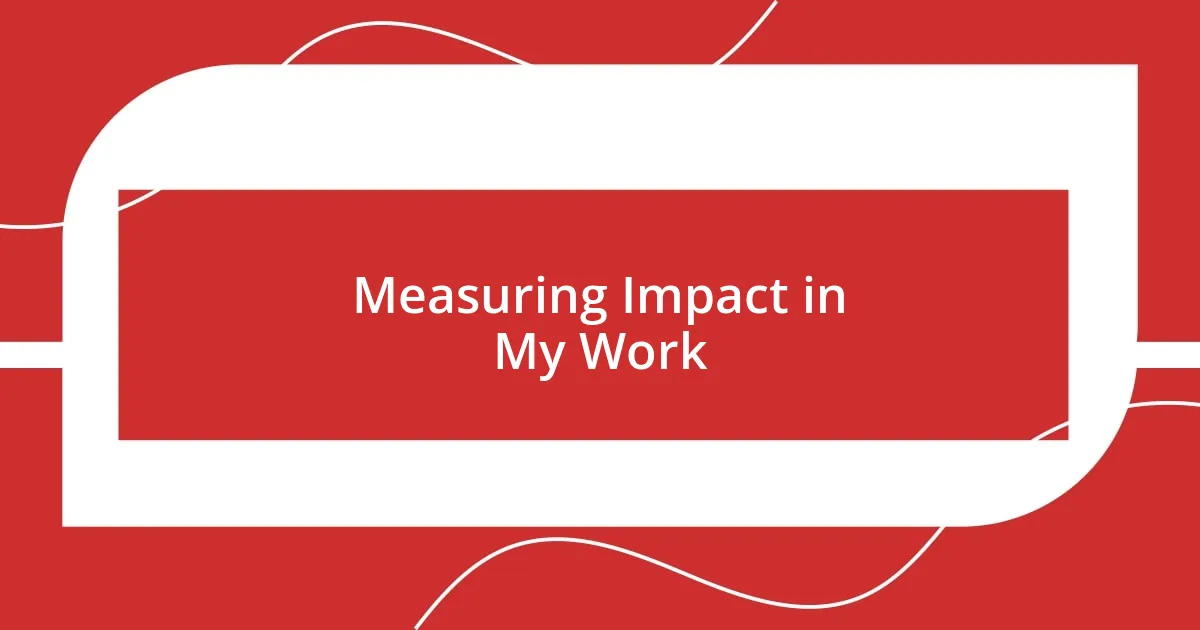
Measuring Impact in My Work
Measuring impact in nonprofit work is often a complex puzzle. I remember working on a literacy program where we decided to track progress through not just attendance, but actual reading improvement scores. What surprised me was how the numbers didn’t just reflect academic gains; they told stories of increased confidence among the children involved. Isn’t it fascinating how quantitative data can capture qualitative change?
Another key area I’ve focused on is gathering feedback directly from those we serve. After launching a community health initiative, we handed out surveys asking participants about their experiences and outcomes. I was moved by the candid responses and realized that their insights could guide our future efforts. Have you ever thought about how much richer your understanding can be when you ask for input from your beneficiaries? It showed me that involving them in the evaluation process fostered a sense of ownership and connection to the projects.
Lastly, I’ve learned the importance of adjusting strategies based on impact assessments. There was a moment during a fundraising campaign when our initial methods didn’t yield the expected results. Instead of pushing ahead blindly, we paused, analyzed the data, and pivoted our approach. It emphasized to me that measuring impact isn’t a one-time event; it’s an ongoing process. How often do we check in on our goals and adapt? This flexibility transformed our outcomes and reinforced the idea that success in nonprofits isn’t just about the end results but also about evolving with our mission.
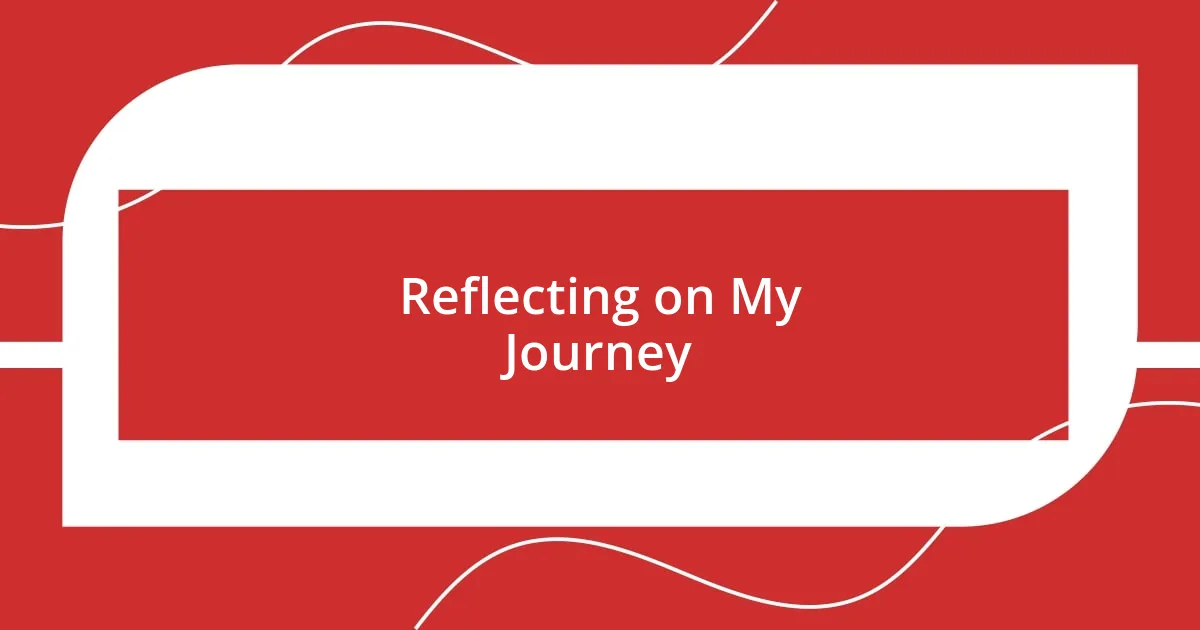
Reflecting on My Journey
Reflecting on my journey in the nonprofit sector brings a swirl of emotions and lessons learned. I clearly remember my first project, stepping into a room filled with passionate people who genuinely wanted to make a difference. The excitement was palpable, but so were my nerves. Could I really contribute meaningfully? That initial encounter shaped my belief that even the smallest contributions can create ripples of change.
As I navigated various roles in different organizations, I often found myself stepping out of my comfort zone. There was a challenging moment during a community outreach event when things didn’t go as planned. The weather turned sour, and we had to scramble to find an indoor venue on short notice. Instead of panicking, I saw this unexpected hurdle as a chance to showcase resilience. It made me realize that adaptability is not merely a skill but an essential mindset to embrace in our journeys.
Looking back, I can’t help but reflect on the profound connections I’ve built along the way. One volunteer I met during a workshop became a lifelong friend, and together, we’ve supported each other through countless initiatives. Isn’t it incredible how a shared passion can spark lasting relationships? I cherish those moments, as they remind me that while the work is vital, the people we share our paths with often leave the most significant impact on our journeys.

